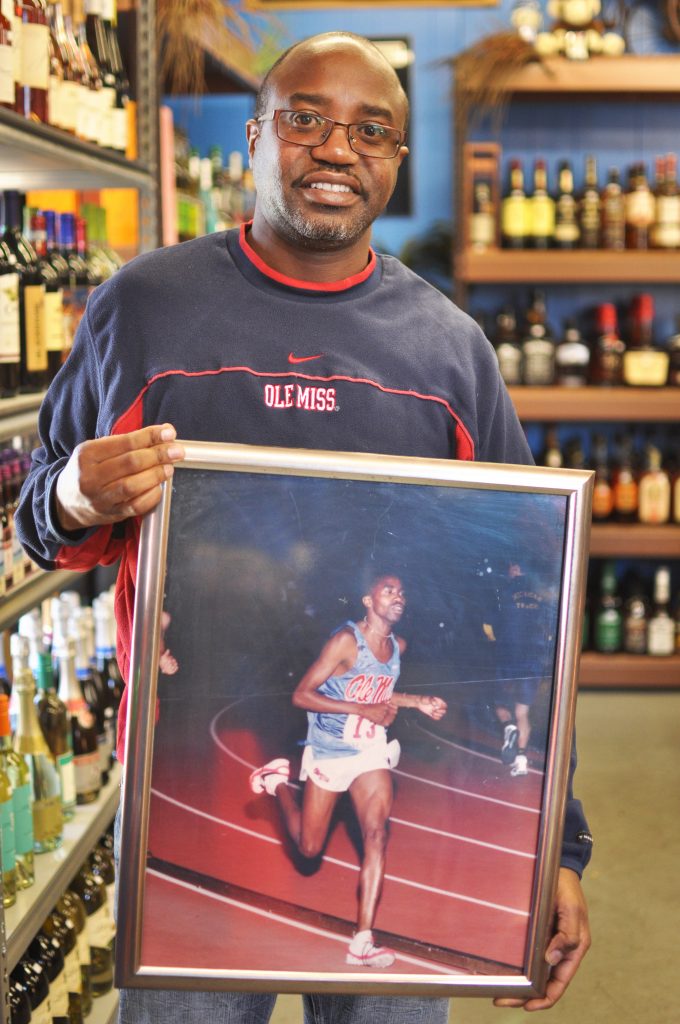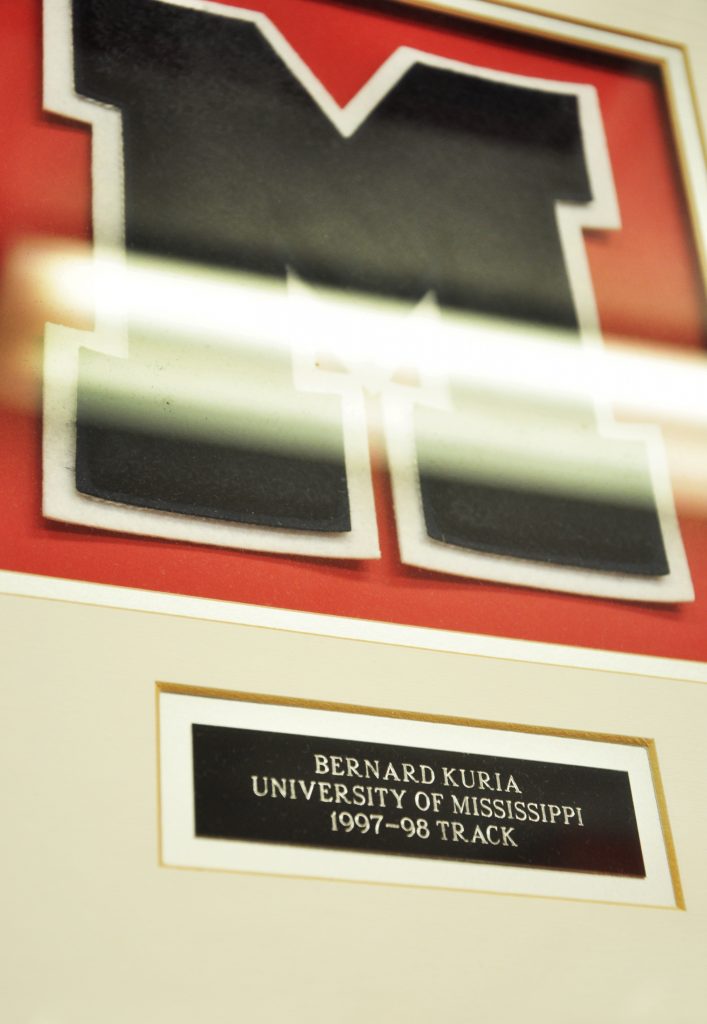Just off the Square on 11th Street are two businesses owned by a former All-SEC cross country runner at Ole Miss.
He spends his day going back and forth between his businesses, Copy Time and Safari Wines and Spirits, putting up a sign that reads, “Ask for Bernard next door” on the door of whichever business he is absent from. He may be found sitting behind the counter at Copy Time waiting for customers or rearranging liquor bottles at Safari. Aside from a few student “helpers,” he runs the stores almost solely on his own.
This is the life of Bernard Kuria, former Ole Miss cross country star turned Oxford business owner. Kuria graduated from Ole Miss in 1998 with a marketing degree followed by a Masters in Business Administration in 2000. However, before he left Ole Miss, he made sure to leave his mark on both the university and the cross country program.
Kuria was born in Kiambu County, Kenya. On an average day during his childhood, Kuria would wake up around 6 a.m. This way he would have enough time to milk the cows, take the milk to the cooperative farmers about a mile away to sell, then go back home to eat breakfast before school at 7:30 a.m.
“(School was) about two to three miles from home. We all ran to school. We couldn’t be late, so if you find yourself running late you just have to run,” Kuria said. “Basically, you run and make sure you’re on time because at that time there was corporal punishment where a teacher can whoop you for being late, so you’re trying by all means not to be late.”

Bernard Kuria displays a photo from his days of being an All-SEC cross country runner at Ole Miss. Photo by Devna Bose
Kuria didn’t see running as a nuisance — he simply viewed it as a way of life. He recalls seeing his brothers running for school teams and his sister doing long and high jumps.
“We were all athletes,” Kuria said. “Me being the youngest, I’m looking up to them, and it’s one of those things that if your big brothers and sisters are doing it, you naturally want to do it.”
Kuria would eventually find himself at a provincial school in Kenya where he competed as a long distance runner. This is where he met a coach by the name of John Webb who would help Kuria earn a scholarship to the University of Florida.
“Somebody approached me and told me, ‘Hey, there’s this coach that helps students who are good runners to go to America,’” Kuria said. “I just wrote a letter introducing myself, and he happened to have been in the same school that I was.”
Webb told Kuria that if he received a university admission, he would help him get to America.
“That was my cue,” Kuria said. “I guess it was his calling to help students transition from Kenya to America.”
Kuria arrived in Gainesville, Florida, for his freshman year in 1995 on an athletics scholarship. However, shortly after arriving on campus, Kuria realized something wasn’t right.
He wasn’t happy at his new home.
“It was real tough at first,” Kuria said. “A new person, new kid, super homesick, too much expectation. I (didn’t) know anybody at all, zero, no other Kenyan there. It was hard for me to transition from the Kenyan education system to this system. First of all, there’s a lot of computer work, which I never saw a computer until I got there.”
On the other hand, Kuria’s running was at an all-time high during his freshman year at Florida.
“It was good because (I was) coming from a high altitude elevation, like 8,000-10,000 feet, to almost like 300 feet above sea level. My lung capacity was great,” Kuria said. “I was really enjoying running, and (I was) winning a lot. That was great, but every time I went by to my room it was just sad.”
That year, Kuria was the No. 1 overall Kenyan long-distance runner and the No. 16 runner in the United States. Subsequently, he was selected to represent Kenya in the 1995 Universiade, or World University Games, in Fukuoka, Japan.
Unfortunately for Kuria, he would never make the trip to Japan for the games. According to Kuria, his coach at Florida denied him the opportunity to compete at the Universiade in 1995.
“He told me, ‘I’m not going to pay for your flight and food and everything to go there only (for you) to wear a Kenyan jersey and not a Florida jersey,’” Kuria said. “To me, he denied me a lot.”
He skipped the team’s trip to Starkville for the SEC Championships, effectively ending his Gator career in the process. After visiting Ole Miss that December, Kuria decided Oxford would be his next destination.
Fortunately, a former coach of Kuria’s was leaving Florida. Coach Joe Walker took a job to be Ole Miss’ cross country coach, which played a big role in Kuria’s decision.
“He was a great runner and a fun guy to coach,” Walker said. “I’ve been able to maintain a relationship with him since that time. He and I are no longer coach and athlete, we’re friends, and I’ve been very proud of him.”
Kuria excelled at Ole Miss. He broke the school record for the best 10k time in his first season as a Rebel with a time of 29:07:38, which still stands today. Kuria was also named an All-SEC performer in 1996.
After redshirting for a year during the fall of ’96 and spring of ’97, he came back and earned yet another All-SEC selection in the fall of 1997. He finished No. 4 in the South Regional Championships that year.
Kuria admits that, for one reason or another, his running took a hit in the ’98 season. He wasn’t named All-SEC, but something special happened at the SEC Championship on Ole Miss’ campus that year.
“So (my mother) is here in April right before the championship, and (Ole Miss) extended her tickets to accompany me,” he said. “It was special for her as she actually got to sit in the stands and see me compete for the first time (ever).”
Following a spectacular running career, Kuria enrolled in the MBA program at Ole Miss. He landed an internship with a research-based start-up called FNC. Upon his graduation, FNC hired him to be a researcher where he would stay until 2003.
“So I’m going to Copy Time. It’s like a cyber cafe with my resume. I’m going there basically to fax and to scan and to apply (for jobs),” Kuria said. “This guy who owned it at the time is like, ‘You know, I can sell this business to you.’”
This piqued Kuria’s interest.

Medals, photos and trophies from Bernard Kuria’s days of running cross country for Ole Miss hang on the wall of Safari Wine and Spirits. Photo by Devna Bose
He would eventually take a gamble on the business by essentially risking his life savings to acquire it.
“It was either going to work, or I’m done,” Kuria said. “There was no plan B, I had to do it all.”
The acquisition eventually paid off. After a few years of ups and downs at Copy Time, Kuria noticed one Saturday that people were parking at his store before making their way to the Grove on Saturdays. This gave him a new business idea: to open a liquor store.
“When people come in and park there, they feel that there’s a liquor store. We don’t have to bring all this liquor,” Kuria said. “So basically I figured out a way to separate the space between Copy Time and open a little liquor store.”
It turned out to be another successful business move for Kuria — Safari Wine and Spirits recently celebrated its 10-year anniversary.
In the process, Kuria’s landlord Phil Bailey and Kuria have built both a good working and personal relationship.
“I usually go by (Copy Time or Safari) every afternoon to say hello,” Bailey said. “(He’s a) great guy. He’s become a good friend. He does what he says he’s gonna do, very trustworthy and a good businessman.”
In Kuria’s more than 20 years in Oxford, he’s certainly made a name for himself in the Oxford and Ole Miss communities. He will be remembered not only as one of the most prolific runners in Rebel history but also as a successful businessman who has left his footprint on the Oxford business scene.






